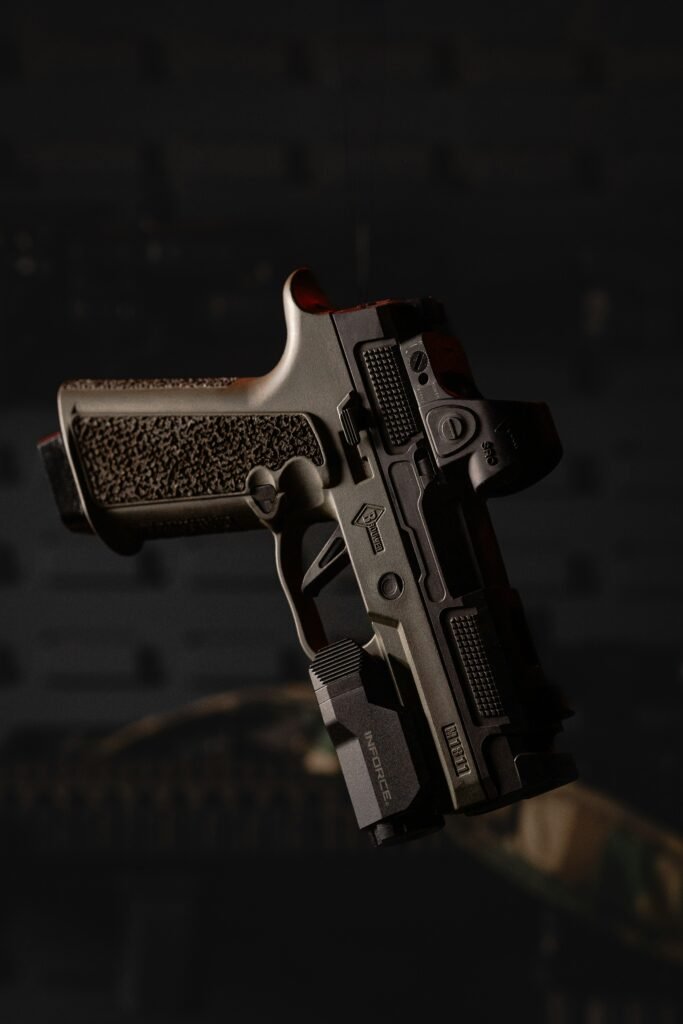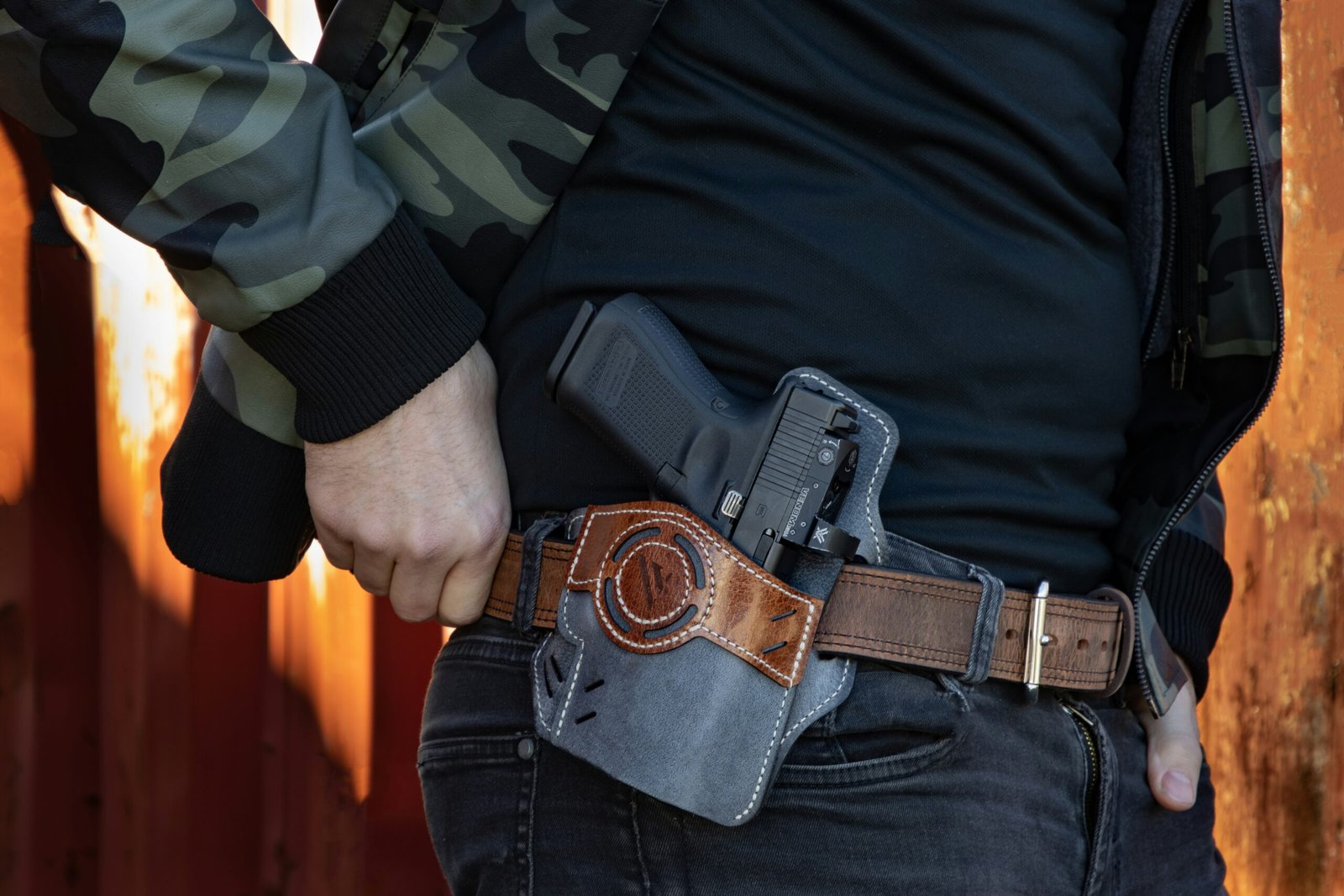Traveling with firearms can be a complex process, but it is essential to familiarize yourself with interstate travel regulations to ensure a safe and hassle-free journey. This article aims to provide you with a comprehensive understanding of the regulations surrounding interstate travel with firearms. From the necessary documentation to transportation guidelines, we will explore the key points you need to know before embarking on your journey. So, whether you’re planning a hunting trip or attending a shooting competition in another state, read on to navigate the intricacies of traveling with firearms.

This image is property of images.unsplash.com.
Overview of Interstate Travel Regulations for Firearms
Definition of interstate travel regulations for firearms
Interstate travel regulations for firearms refer to the laws and regulations that govern the transportation of firearms across state lines in the United States. These regulations are crucial for firearm owners to understand, as they vary between states and can have serious consequences if not followed correctly.
Importance of understanding these regulations
Understanding interstate travel regulations for firearms is of utmost importance for firearm owners who plan to travel with their firearms. Failure to comply with these regulations can result in legal complications, fines, and even the seizure of firearms. By being knowledgeable about these regulations, firearm owners can ensure a smooth and legal travel experience while maintaining the safety and security of themselves and others.
Federal Laws and Regulations
Firearms Owners’ Protection Act (FOPA)
The Firearms Owners’ Protection Act (FOPA) is a federal law that provides certain protections for firearm owners traveling across state lines. It has provisions that exempt travelers from state laws that regulate firearm possession, as long as the firearms are unloaded and stored in a locked container during transport.
Transporting firearms across state lines
Under federal law, it is generally legal to transport firearms across state lines as long as certain requirements are met. The firearms must be unloaded and securely stored in a locked container, separate from any ammunition. The container should not be easily accessible from the passenger compartment of the vehicle.
Requirements for transportation
When transporting firearms across state lines, it is important to comply with specific requirements. These include ensuring that the firearms are unloaded, stored in a locked container, and not readily accessible. Additionally, it is essential to research and understand the specific laws and regulations of the states one will be traveling through, as they may have additional requirements or restrictions.
Exceptions and limitations
While federal law generally allows for the transportation of firearms across state lines, there are certain exceptions and limitations to be aware of. Some states have stricter regulations and may require the traveler to obtain permits or licenses even for temporary transport. Additionally, certain types of firearms, such as assault weapons, may be subject to further restrictions and are prohibited in some states.
Penalties for non-compliance
Non-compliance with interstate travel regulations for firearms can lead to severe penalties. These penalties can include criminal charges, fines, and the confiscation of firearms. It is crucial to familiarize oneself with the laws and regulations of each state one intends to travel through and ensure strict compliance to avoid any legal issues.
State-Specific Regulations
Differences between state laws and federal laws
While federal laws provide a baseline for interstate travel regulations for firearms, individual states have the authority to enact their own laws and regulations. This can result in significant differences between state laws and federal laws, including variations in permitted firearms, ammunition restrictions, and permit requirements. It is essential to research and understand the specific regulations of the states one will be traveling within.
Legal requirements for transporting firearms within states
When traveling within a state, it is necessary to become familiar with the legal requirements for transporting firearms. Some states may have stricter regulations regarding the transport of firearms, such as requiring the firearms to be locked in a specific manner or placed in a separate compartment from the passenger area. It is crucial to adhere to these requirements to avoid any legal complications.
Restrictions on firearm types, ammunition, and magazine capacity
States can impose restrictions on specific types of firearms, ammunition, and magazine capacities. Some states may prohibit the possession or transport of certain firearms considered to be “assault weapons” or have restrictions on high-capacity magazines. It is crucial to research and understand these restrictions to prevent legal issues during interstate travel.
Permit requirements
Many states require firearm owners to obtain permits or licenses to possess or carry firearms within their borders. These permits may vary in terms of their requirements, application processes, and reciprocity with other states. It is important to understand and comply with these permit requirements, especially when traveling across state lines.
Reciprocity agreements between states
Reciprocity agreements between states determine whether a concealed carry permit issued by one state is recognized and valid in another state. These agreements can vary significantly from state to state, and not all states have reciprocity with each other. It is crucial to understand the reciprocity agreements between the states one intends to travel through and ensure compliance with their regulations.
Transporting Firearms through Airports
TSA regulations for traveling with firearms
The Transportation Security Administration (TSA) has specific regulations regarding the transportation of firearms through airports. These regulations aim to ensure the safe and legal transport of firearms while maintaining airport security. It is important to comply with these regulations to avoid any issues during air travel with firearms.
Properly declared and packaged firearms
When traveling with firearms by air, they must be properly declared and packaged. Firearms must be unloaded and locked in a hard-sided container that cannot be easily accessed during the flight. Ammunition must also be properly packaged in manufacturer’s original boxes or a secure container.
Providing notification to the airline
It is necessary to notify the airline when checking firearms as luggage. Airlines may have specific procedures and requirements for transporting firearms, such as completing a firearm declaration form. It is recommended to contact the airline in advance to understand their specific policies and ensure compliance.
Checking firearms in luggage
Firearms must be checked as luggage and cannot be carried onto the aircraft. They should be transported in a locked hard-sided container and checked at the airline’s ticket counter. It is important to follow the airline’s specific instructions for checking firearms, as they may have additional requirements or restrictions.
Additional considerations for international travel
When traveling internationally with firearms, it is crucial to research and comply with the laws and regulations of the destination country. Different countries have varying rules regarding the possession and transport of firearms, and failure to comply can result in serious legal consequences. Consulting with legal counsel and local authorities is highly recommended before traveling internationally with firearms.

This image is property of images.unsplash.com.
Concealed Carry Reciprocity
Definition of concealed carry reciprocity
Concealed carry reciprocity refers to the recognition of a concealed carry permit issued by one state in another state, allowing the permit holder to legally carry a concealed firearm across state lines. Reciprocity agreements between states facilitate the recognition of concealed carry permits from one state in another, simplifying the process for permit holders to legally carry their firearms while traveling.
States with reciprocity agreements
Many states have entered into reciprocity agreements with other states, allowing concealed carry permit holders to carry their firearms across state lines. The specific states with reciprocity agreements can vary, and it is essential to research and understand the reciprocity status between the states one intends to travel through.
Requirements for concealed carry permit holders
When carrying a concealed firearm with a permit, it is necessary to comply with the requirements of the issuing state. This includes carrying the permit at all times, abiding by any restrictions or limitations placed on the permit, and understanding the laws and regulations of the state in which one is traveling. Failure to comply with these requirements can result in legal consequences.
Factors affecting reciprocity
Reciprocity agreements can be influenced by a variety of factors, including differences in permit issuance standards, training requirements, and background checks. Additionally, changes in state laws or regulations can impact reciprocity agreements. It is important to stay informed about any changes in reciprocity and regularly check the status of reciprocity agreements between states.
Understanding restrictions in non-reciprocal states
In states where there is no reciprocity with one’s concealed carry permit, it is vital to understand and comply with the local laws and regulations regarding the possession and carry of firearms. Carrying a concealed firearm without the appropriate permit in a non-reciprocal state can result in serious legal consequences. It is advisable to research and understand the laws of each state to ensure compliance while traveling.
Interstate Transport of NFA Firearms
National Firearms Act (NFA) regulations
The National Firearms Act (NFA) regulates the possession, transfer, and transport of certain firearms, including Title II firearms such as machine guns, short-barreled rifles, and silencers. Compliance with NFA regulations is essential when transporting such firearms across state lines.
Transporting Title II firearms (e.g., machine guns, silencers)
Transporting Title II firearms across state lines requires careful consideration and adherence to NFA regulations. Prior to transporting, proper registration and compliance with federal regulations, such as obtaining the necessary tax stamps, is required. It is important to consult the Bureau of Alcohol, Tobacco, Firearms and Explosives (ATF) for guidance and to ensure compliance.
ATF Form 5320.20 for interstate transportation
To transport NFA firearms across state lines, individuals must submit ATF Form 5320.20 to the ATF. This form notifies the ATF of the planned interstate transport and requires approval before the transportation can take place. It is crucial to submit the form well in advance of the intended travel date to allow for processing time.
Notification to ATF and local authorities
In addition to submitting ATF Form 5320.20, it may be necessary to notify local law enforcement authorities of the planned interstate transport of NFA firearms. Some states require prior notification to local authorities, and failure to do so may result in legal complications. It is advisable to research and comply with the notification requirements of each state being traveled through.
Complying with state-specific NFA regulations
In addition to federal NFA regulations, some states have their own regulations regarding the possession and transport of NFA firearms. These regulations can vary, and it is crucial to research and understand the specific regulations of each state to ensure compliance. Non-compliance with state-specific NFA regulations can lead to legal consequences.

This image is property of images.unsplash.com.
Traveling with Firearms in Vehicles
Transporting firearms in personal vehicles
Transporting firearms in personal vehicles requires compliance with both federal and state laws. Firearms should be unloaded and stored securely in a locked container, separate from ammunition. Many state laws require firearms to be stored in the trunk of a vehicle or in a locked compartment that is not accessible from the passenger area.
Storing firearms securely during travel
While traveling with firearms in a vehicle, it is important to store them securely to prevent unauthorized access and ensure safety. Lockable cases or containers specifically designed for firearm storage are recommended. These cases should be placed out of sight, such as in the trunk, to minimize the risk of theft or misuse.
Restrictions on loaded firearms in vehicles
Certain states have restrictions on the possession of loaded firearms in vehicles. It is essential to understand and comply with these restrictions to avoid any legal complications. In some states, loaded firearms may only be carried in vehicles under specific circumstances, such as for self-defense or while engaged in specific lawful activities.
Transporting firearms in rental cars
When renting a vehicle, it is important to familiarize oneself with the rental company’s policies regarding the transportation of firearms. Some rental companies may have restrictions or prohibitions on transporting firearms in their vehicles. It is advisable to contact the rental car company in advance to understand their specific policies and ensure compliance.
Understanding laws for stops or overnight stays
When making stops or overnight stays during interstate travel with firearms, it is necessary to understand and comply with the laws of the states in which one will be stopping. Some states may have restrictions on the possession or transport of firearms, and it is important to adhere to these regulations to avoid any legal complications.
Safe Storage and Firearm Transportation Devices
Importance of safe storage during transportation
Safe storage of firearms during transportation is crucial to prevent accidents, theft, and unauthorized access. It is important to ensure that firearms are stored securely, unloaded, and inaccessible to unauthorized individuals. Proper storage minimizes the risks associated with travel and ensures the safety and security of the firearm owner and the general public.
Types of firearm transportation devices
There are various firearm transportation devices available that provide secure storage during travel. These include lockable cases, firearm safes, and portable lockboxes. These devices are designed to prevent unauthorized access and comply with the specific requirements of federal and state laws for firearm transportation.
Locking devices and secure containers
When transporting firearms, it is important to utilize locking devices and secure containers to ensure compliance with regulations and prevent unauthorized access. Locks should be of high quality and resistant to tampering. Secure containers should be constructed of sturdy materials that cannot be easily breached.
Requirements for firearm storage in vehicles
State laws may have specific requirements for the storage of firearms in vehicles during travel. These requirements may include locking the firearm in the trunk, using a specific type of storage device, or securely storing the firearm out of reach in a locked compartment. It is important to understand and comply with these requirements to avoid any legal complications.
Choosing the right storage option for compliance
When selecting a storage option for firearm transportation, it is essential to consider the specific requirements of federal and state laws. The chosen storage option should provide secure, lockable, and compliant storage for firearms during travel. It is advisable to research and select a storage option that meets these requirements to ensure legal compliance.

This image is property of images.unsplash.com.
Firearms and Public Transportation
Firearm transport restrictions on public transportation
Public transportation, such as buses and trains, often have restrictions on the transport of firearms. It is important to familiarize oneself with the policies of the specific transportation provider regarding firearms. These policies may prohibit the transport of firearms altogether or may require specific authorization or documentation.
Transporting firearms on buses and trains
Transporting firearms on buses and trains can be challenging due to the varying policies and regulations of different transportation providers. Some providers may have strict restrictions or prohibitions on firearms, while others may allow transportation under certain conditions. It is necessary to contact the transportation provider in advance and understand their specific policies to ensure compliance.
Local transit regulations
In addition to the policies of transportation providers, local transit regulations may also impact the transport of firearms. Some cities or municipalities may have additional restrictions or requirements for transporting firearms on public transportation within their jurisdiction. It is essential to research and understand these regulations to ensure compliance.
Transportation guidelines for ammunition
In addition to regulations for transporting firearms, there may also be guidelines for transporting ammunition on public transportation. These guidelines may include carrying ammunition in specific containers or limiting the quantity that can be transported. It is important to research and understand these guidelines to comply with the regulations of transportation providers and local authorities.
Understanding federal regulations
Federal regulations may also impact the transportation of firearms on public transportation. The Transportation Security Administration (TSA) has specific regulations for transporting firearms and ammunition on commercial flights. It is essential to comply with these federal regulations when traveling on public transportation.
Resources for Understanding Interstate Travel Regulations
ATF website and resources
The Bureau of Alcohol, Tobacco, Firearms and Explosives (ATF) website is a valuable resource for understanding interstate travel regulations for firearms. The website provides information on federal regulations, forms, and guidelines for transporting firearms. It is a comprehensive source of information for firearm owners seeking guidance on compliance with federal laws.
State-specific firearm laws
Understanding state-specific firearm laws is crucial for complying with interstate travel regulations. Each state may have its own laws, regulations, and requirements for firearm transportation. State-specific websites, legal resources, and law enforcement agencies can provide detailed information on the regulations of each state being traveled through.
Firearms industry associations
Firearms industry associations, such as the National Rifle Association (NRA), can provide resources and guidance on interstate travel regulations for firearms. These associations often offer educational materials, legal support, and updates on changes in firearm laws and regulations. Membership in such associations can provide access to valuable information and resources.
Legal counsel and consultation
Consulting with legal counsel specializing in firearms and transportation laws can offer valuable guidance and ensure compliance with interstate travel regulations. Legal professionals can provide individualized advice based on one’s specific circumstances and the laws of the states being traveled through. They can also assist with the understanding and completion of required forms and notifications.
Online forums and communities for sharing experiences
Engaging with online forums and communities dedicated to firearms and travel can provide valuable insights and personal experiences regarding interstate travel regulations. These platforms allow individuals to share information, ask questions, and gain knowledge from others who have traveled with firearms. It is important to remember that information obtained from online sources should be verified with official sources and legal counsel.



